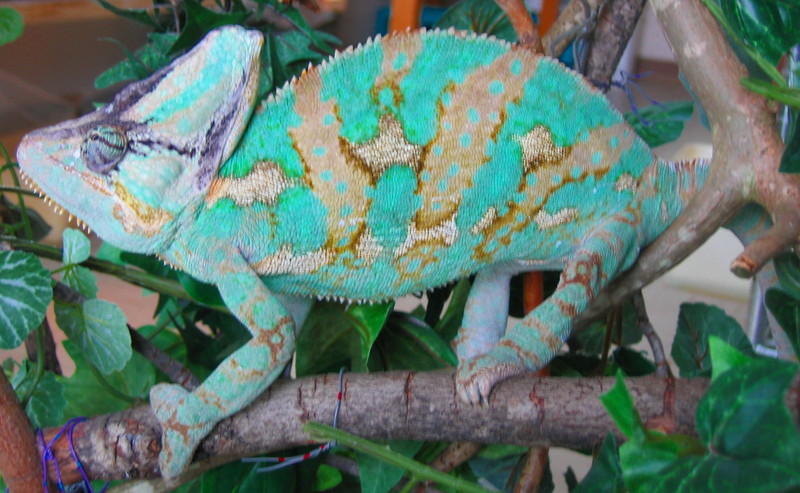|
| Query: Sauria | Result: 27th of 28 | |
Veiled Chameleon (Chamaeleo calyptratus) - Wiki
| Subject: | Veiled Chameleon (Chamaeleo calyptratus) - Wiki
| |

| Resolution: 2160x1330
File Size: 684481 Bytes
Date: 2004:06:15 16:40:28
Camera: Canon PowerShot A80 (Canon)
F number: f/3.2
Exposure: 1/13 sec
Focal Length: 366/32
Upload Date: 2008:01:17 10:33:56
|
Veiled Chameleon
From Wikipedia, the free encyclopedia
Order: Squamata
Suborder: Sauria
Family: Chamaeleonidae
[Photo] A young adult male veiled chameleon, Chamaeleo calyptratus with a characteristically masculine casque. Foot spurs are present, though not clearly visible in this photograph. Author: http://en.wikipedia.org/wiki/User:Geoff Date: 15 June 2004. Source: http://en.wikipedia.org/wiki/Image:C_Calyptratus_male.jpg | Permission is granted to copy, distribute and/or modify this document under the terms of the GNU Free Documentation License, Version 1.2 or any later version published by the Free Software Foundation; with no Invariant Sections, no Front-Cover Texts, and no Back-Cover Texts. A copy of the license is included in the section entitled "GNU Free Documentation License". |
The Veiled Chameleon (Chamaeleo calyptratus), is a large species of chameleon found in the mountain regions of Yemen and Saudi Arabia. It is also sometimes referred to as the Yemen Chameleon.
The male veiled chameleon is green in color and, depending on mood, this green will range from a bright lime green to a red olive drab. The green base color is marked with stripes and spots of yellow, brown, and blue. Non breeding females and juvenile chameleons are generally a uniform green color with some white markings. Breeding and gravid females are a very dark green with blue and yellow spots. The prominence of these markings is dependent on several factors including health, mood, and temperature of the lizard.
This species is sexually dimorphic, meaning it is possible to tell the gender of an individual by looking at physical traits. Aside from the previously mentioned color differences, adult male veiled chameleons are large animals. It is possible for them to reach an over all length of 24 inches (60 cm). Most specimens usually reach between 14 to 18 inches (35-45 cm). Females are smaller with the average overall length being just under 12 inches (30 cm). Males and females both have a decorative growth called a "casque" on their heads. The casque of a male chameleon is much taller than the female's. Males also have a spur on each hind leg that the females do not have.
Like most chameleons, veiled chameleons are specialized tree dwellers. They have a flattened body meant to mimic a leaf and feet specially designed for grasping limbs and branches. They have a prehensile tail that acts as a fifth appendage and aids in climbing. Their eyes work independently of one another allowing the chameleon to look in front of and behind itself at the same time. They have a long sticky tongue that they use to capture their insect prey. Veiled chameleons are ambush predators and are capable of lying still for very long periods of time waiting for an unsuspecting locust to wander by.
Veiled Chameleons are omnivores. While their main diet consists of insects, they will occasionally consume the leaves and blossoms of various plants. This is especially true in times of drought when water is scarce. Like all chameleons, veiled chameleons prefer to drink water that is in drops. They do not always recognize standing water and may dehydrate if that is their only source.
Female veiled chameleons can produce up to 3 clutches of eggs a year. Each clutch may contain 20-70 eggs. The eggs usually take 6-9 months to hatch. All the eggs in the same clutch will hatch simultaneously, as long as they are incubated together. Female veiled chameleons will produce multiple clutches of eggs, with one male encounter and produce infertile eggs when there is no male, similar to chickens.
Veiled Chameleons are often kept in captivity due to the fact that they are relatively hardy when compared to other chameleon species often offered for sale.
http://en.wikipedia.org/wiki/Veiled_Chameleon
| The text in this page is based on the copyrighted Wikipedia article shown in above URL. It is used under the GNU Free Documentation License. You may redistribute it, verbatim or modified, providing that you comply with the terms of the GFDL. |
|
Comments |
|---|
| | hailee |
|
this is the best picturer ever and im a 3-rd grader and we are studeying about the madagascan chaeleons and i think scientist are so cool that they get to see that stuff and my dream is to be a fahtion desigher and a scientist so can i ever go on a mishtione with you guys seem really cool and i love that you guys know so much well i haved to go well bye
love,
hailee burdick |
^o^
Animal Pictures Archive for smart phones
^o^
|
|
|

